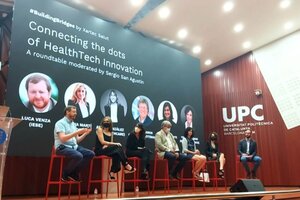Retaining talent and fostering public-private partnerships, some of the challenges that is facing the HealthTech sector
Xartec Salut has opened the debate on the main challenges of the Catalan ecosystem to become an international reference in the field of health technologies.
What are Catalonia's strengths as an ecosystem of innovation in health technology? How can effective open innovation be established between the different actors? What should be the role of the public and private sector in the dynamization and promotion of these processes? These are some of the questions that have been resolved in "Building Bridges for HealthTech Innovation", the first event in a series of conferences organised by Xartec Salut (coordinator by Dr. Alexandre Perera · IRSJD) to promote synergies between the entire ICT community.
Most of the experts agreed on the need to develop an environment that allows us to bring the talent and quality research we already have to the market. "Synergies between the different actors in the ecosystem, collaboration between public administrations and private industry and the promotion of entrepreneurship in science are essential to accelerate technology transfer", they pointed out.
Natalia Olson-Urtecho, entrepreneur and former advisor to Barack Obama, highlighted the role and model of Venture Capital in the United States, one of the main differences in terms of regulation and support for innovation between Europe and America. Olson emphasized the importance of collaboration and coordination between the different agents in order to make progress in the field of health technologies. "I hope that Barcelona will be the most innovative region in the Mediterranean in the coming years," she said.
The improvement of the ecosystem and the retention of talent were two of the central points of the round table "Connecting the dots of HealthTech innovation" in which specialists from different environments participated; Luca Venza, Director of Technological Innovation, Transfer and Acceleration at IESE Business School; Núria Martí, director of innovation at Biocat; Anais González, Executive academic Account Manager at General Electric Healthcare; Lluís Blanch, director of ITEMAS and director of research and innovation at Parc Taulí Hospital Universitari; Tania Sagaste (CEO of Psious) and Yolanda Casas (COO Neuroelectrics).
Núria Martí (Biocat) highlighted the excellent research being developed by the industry as a whole, as well as the rise of new companies in recent years. "Every week an average of one new company is created in the health sector in Catalonia", she said.
"Our goal is that Barcelona becomes the HealthTech hub of the Mediterranean, we want to make internationally visible the power of this region to attract talent and investment", said Yolanda Casas (Neuroelectrics). A vision shared by the other speakers, who also highlighted the lack of resources and investment. "We have a great opportunity ahead of us, but if we want to position ourselves, we need more injection of capital into start-ups", said Tania Sagaste (Psious).
Luca Venza (IESE) pointed out the need for a greater entrepreneurial vision. "We have to maintain our European character of humility, but with more ambition, making the most of all resources". Regarding the collaboration between institutions, Lluís Blanch (Parc Taulí/ITEMAS) explained that the most difficult thing is to understand public-private collaboration as a competitive model. "We need to regulate deregulation so that it is agile and dynamic, to continue generating talent and so that researchers can also gain access to large corporations", concluded Blanch.
A journey that allowed to introduce the Venture Builder programme of Xartec Salut as well as the spin-offs selected in the first call of the network led by CREB UPC. A round of pitches to meet the projects of Exheus (Teresa Tarragó), Health Circuit (Isaac Cano), Xatkit (Jordi Cabot), Virtual Perfusionist (Dani Tost), Vincer. AI (Pol Solà), Astra (Mario Ceresa) and Women Up (Joan Grasas).
About Xartec Salut
Xartec Salut, led by Medical Technologies from the Institut de Recerca Sant Joan de Déu (IRSJD) in CREB-UPC. The network is made up of 47 research groups from Catalonia that belong to 17 different institutions.
Xartec Salut aims to be a catalyst for R+D+I in the field of HealthTech in Catalonia, fostering the exchange of knowledge and technology transfer between research groups, institutions, hospitals and companies, promoting the creation and growth of new innovative companies and offering more efficient instruments for technology transfer with a greater economic and social impact.
It focuses on reducing the gap between research and impact on the market, generating tools that facilitate the arrival of technologies that address the needs of the health world. The intention is to move forward by providing more efficient answers in terms of demand, responding to the speed of the market and adjusted to the real needs of the patients.
Xartec Salut aims to create several programmes for the valorization and tech transfer of the HealthTech field. Our programmes include different stages of the innovation process: idea generation, co-creation, support in the valorisation process and supporting technology transfer. The initiative involves a wide variety of technologies: robotics, blockchain, AI, IoT and wearables, Big Data and analytics, AR/VR and 3D printing, amongst others.Reference
Retaining talent and fostering public-private partnerships, some of the challenges that is facing the HealthTech sector

Xartec Salut aims to be a catalyst for R+D+I in the field of HealthTech in Catalonia, fostering the exchange of knowledge and technology transfer.
